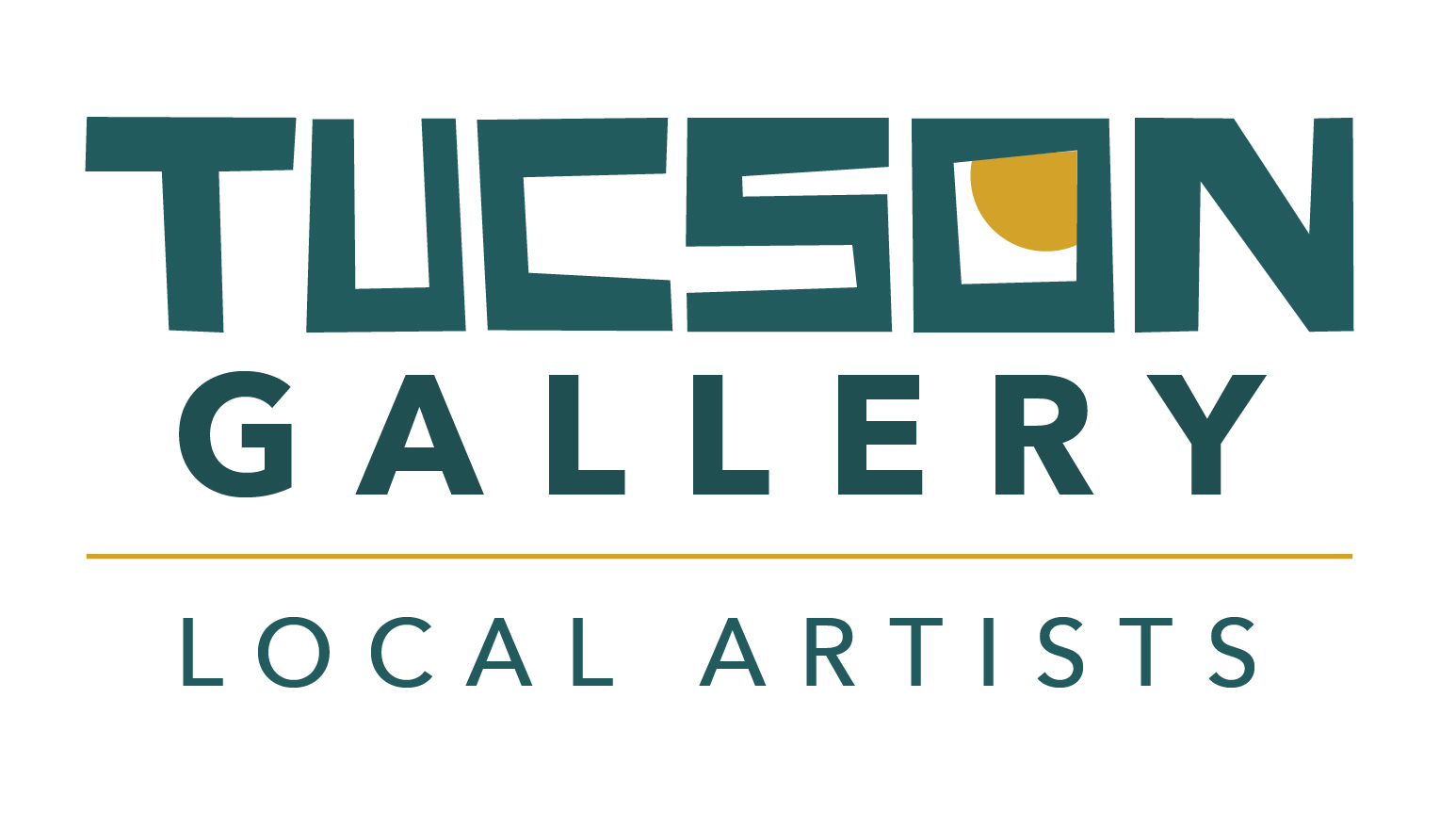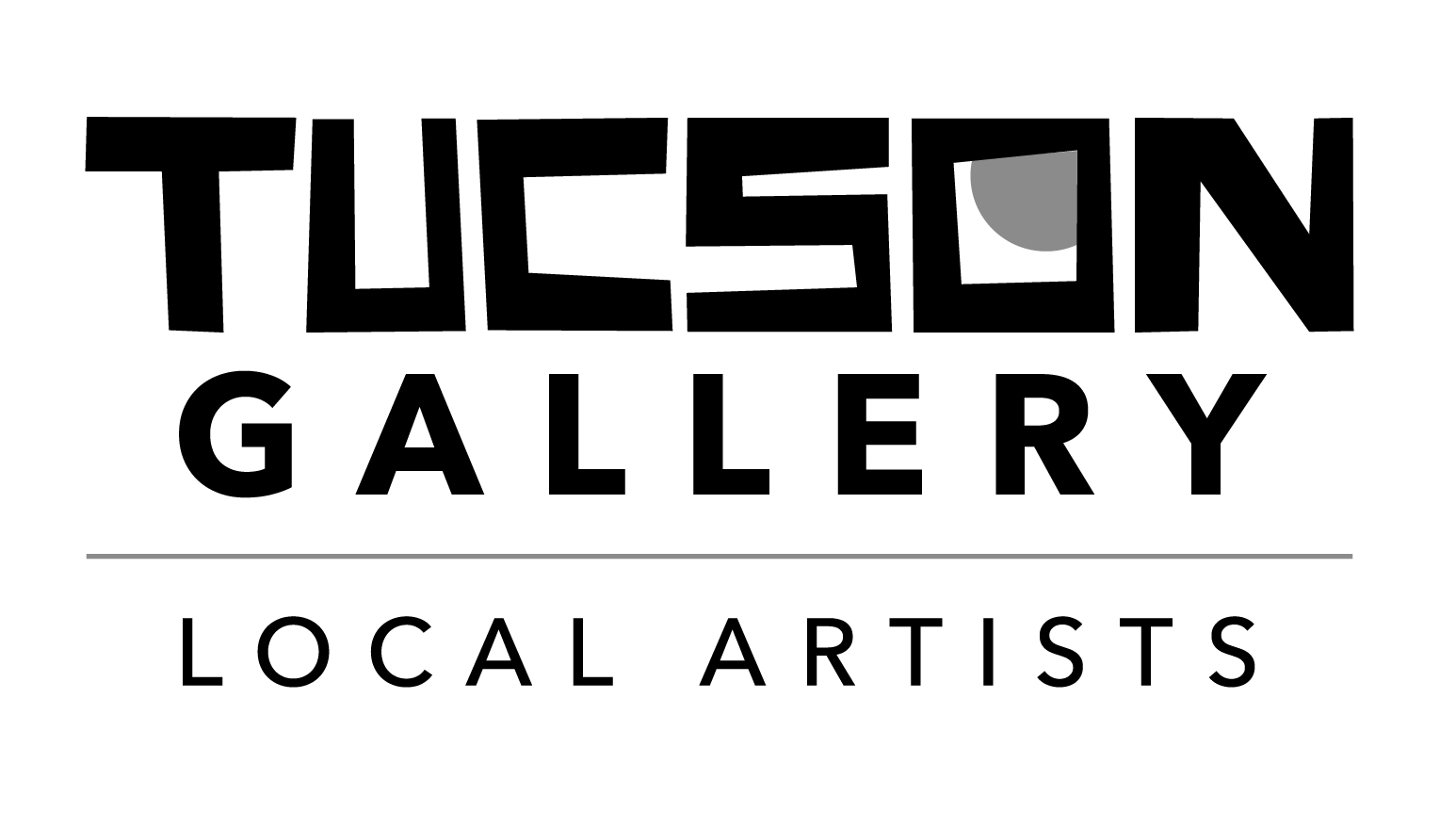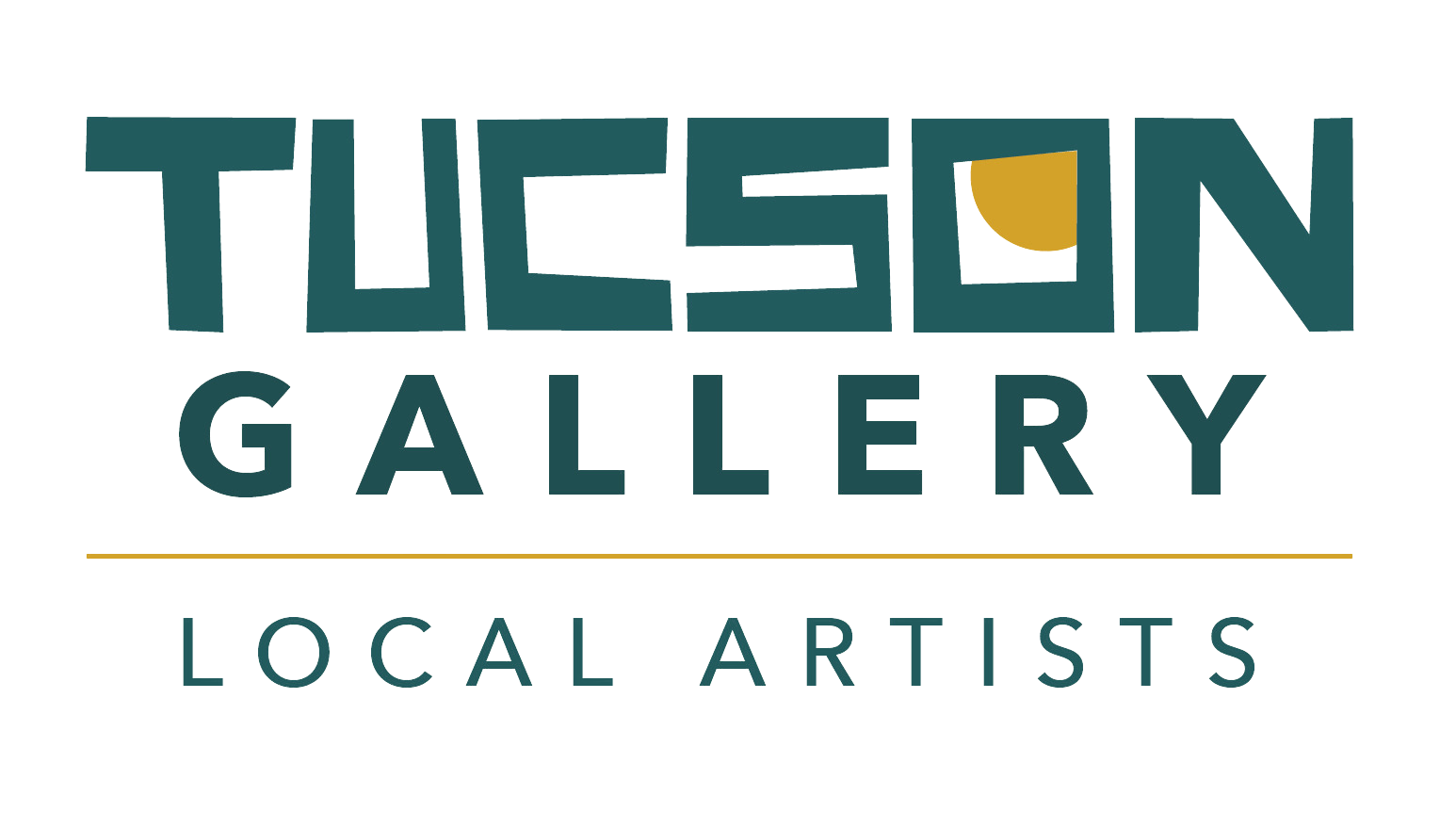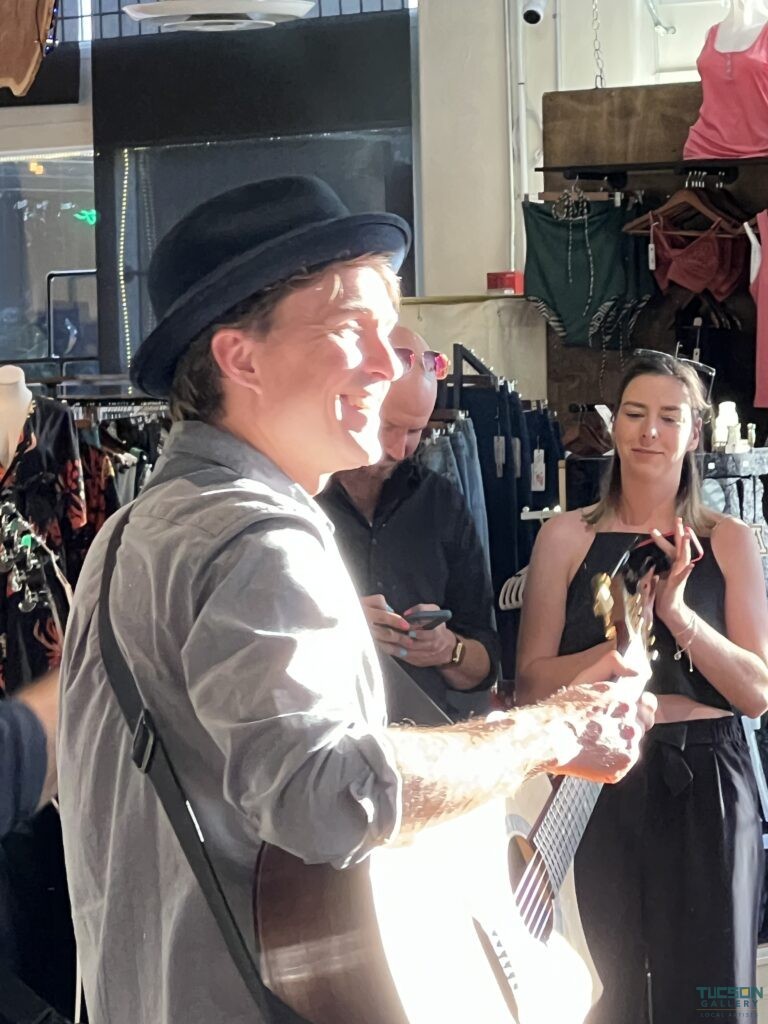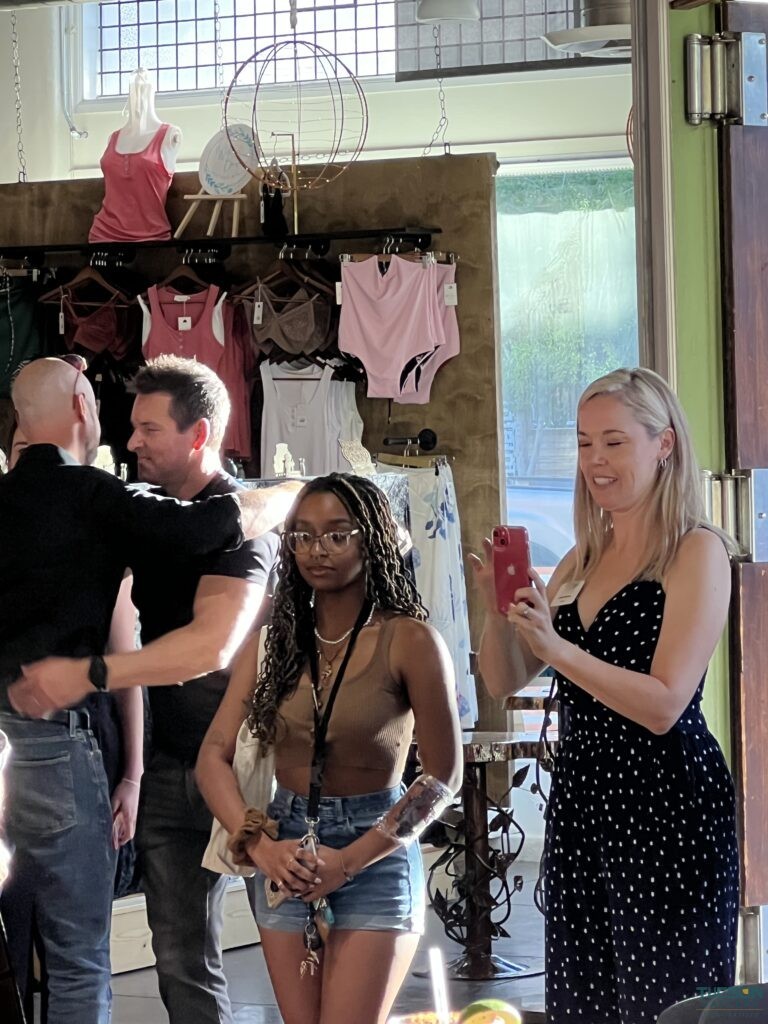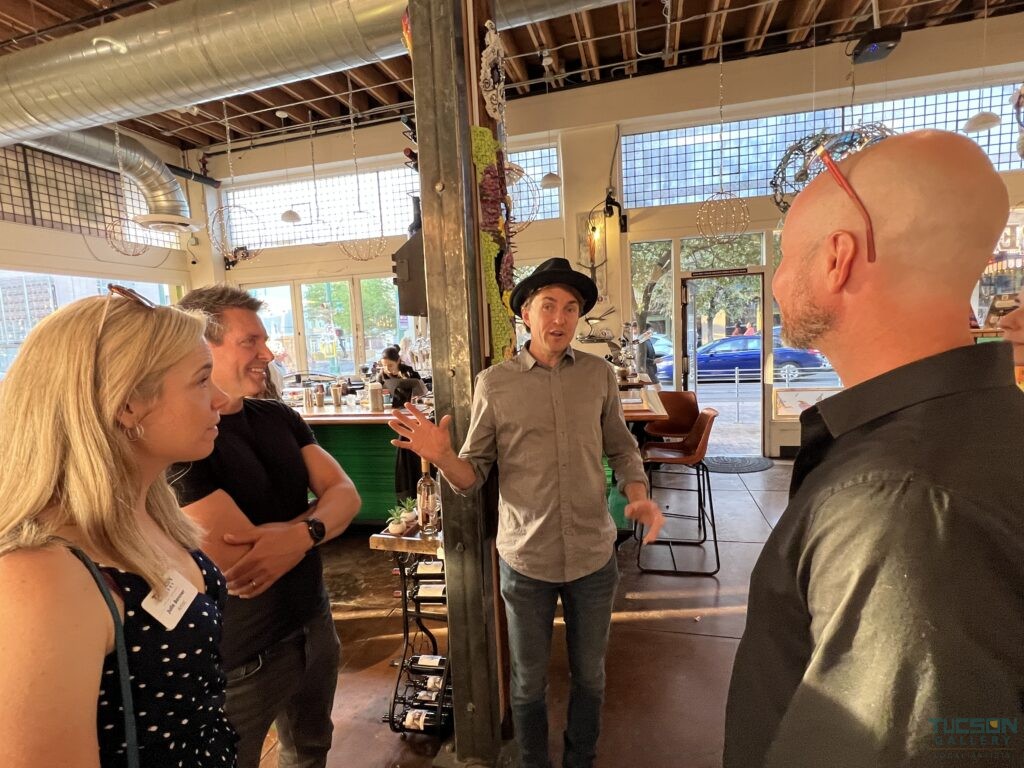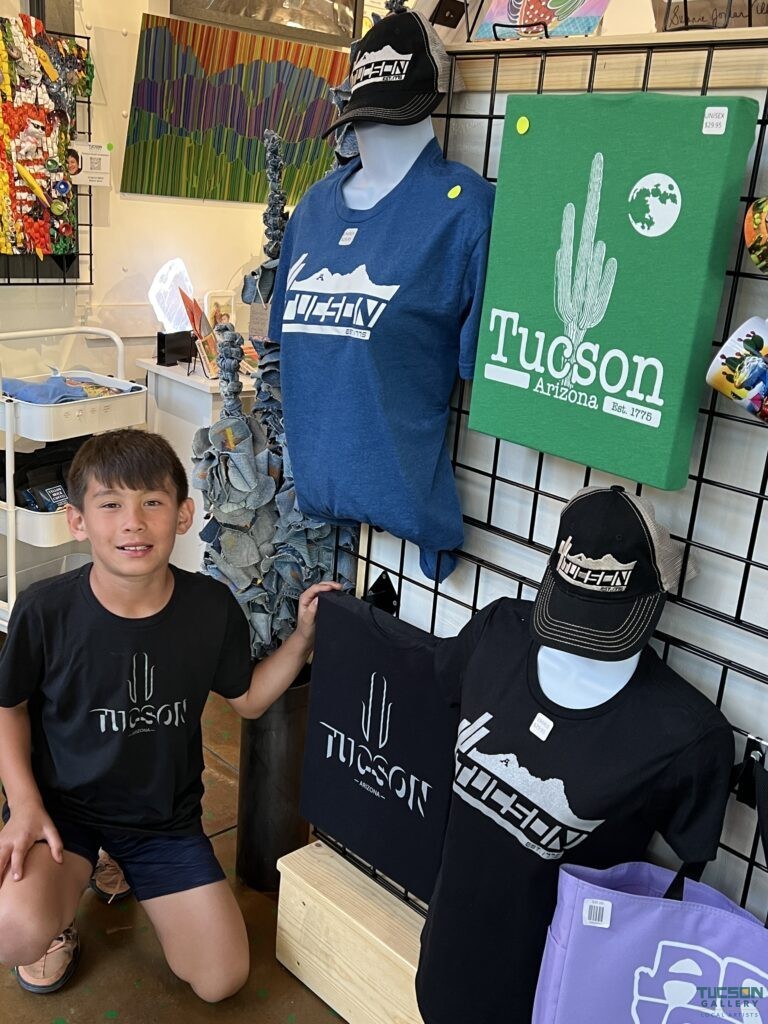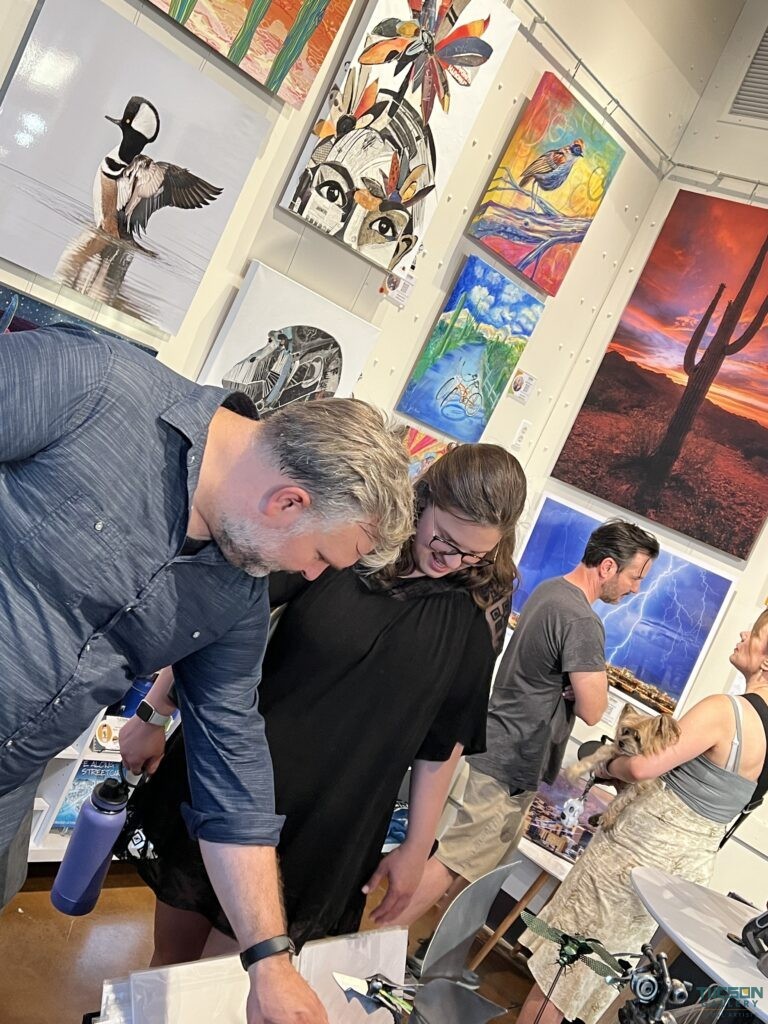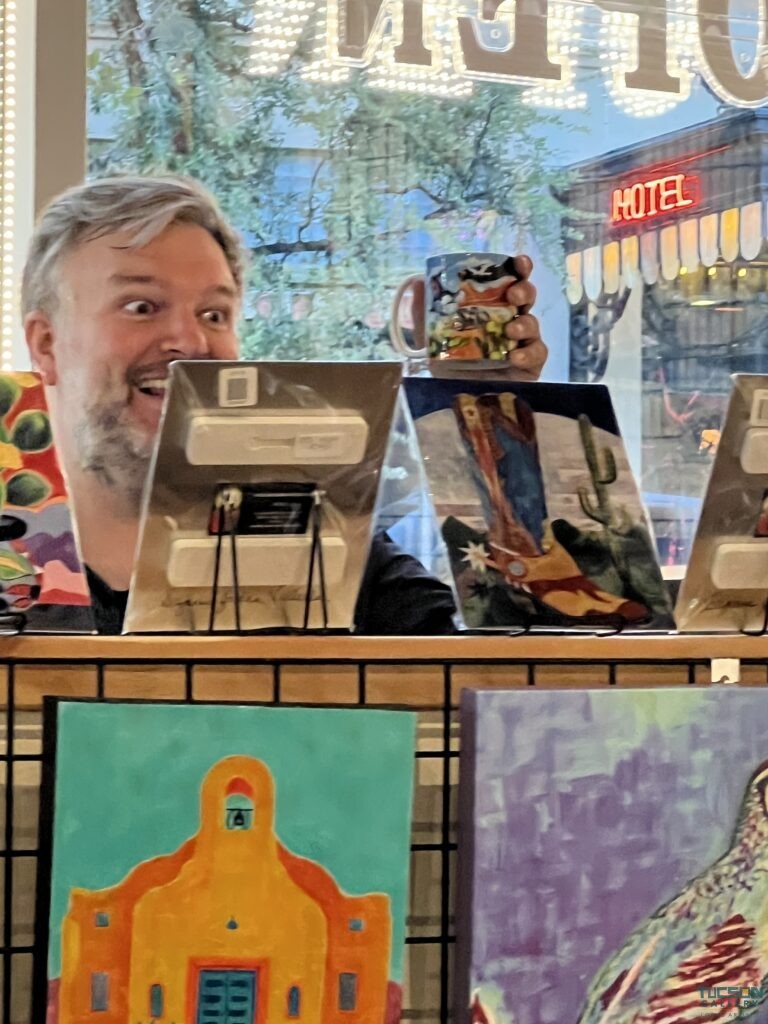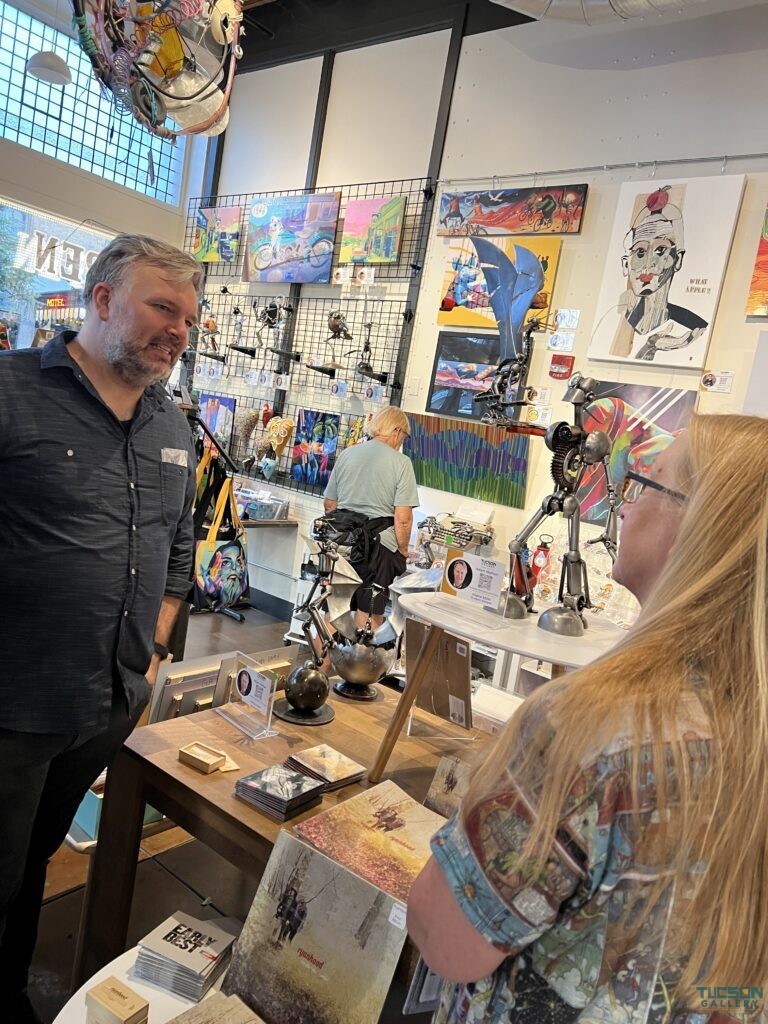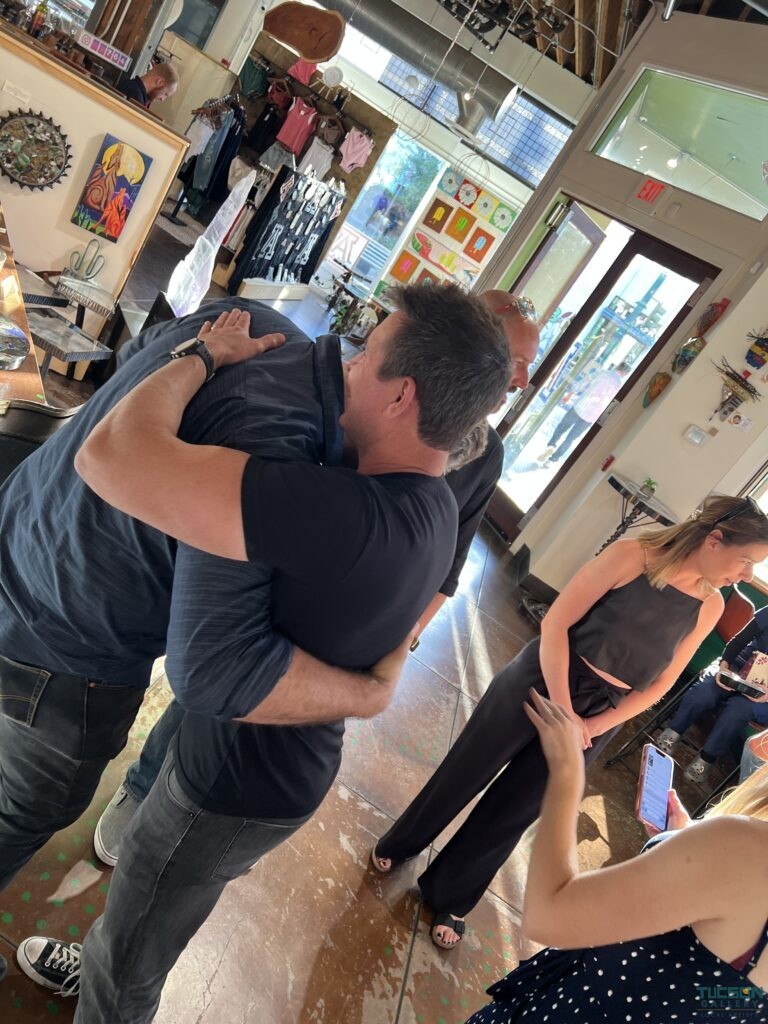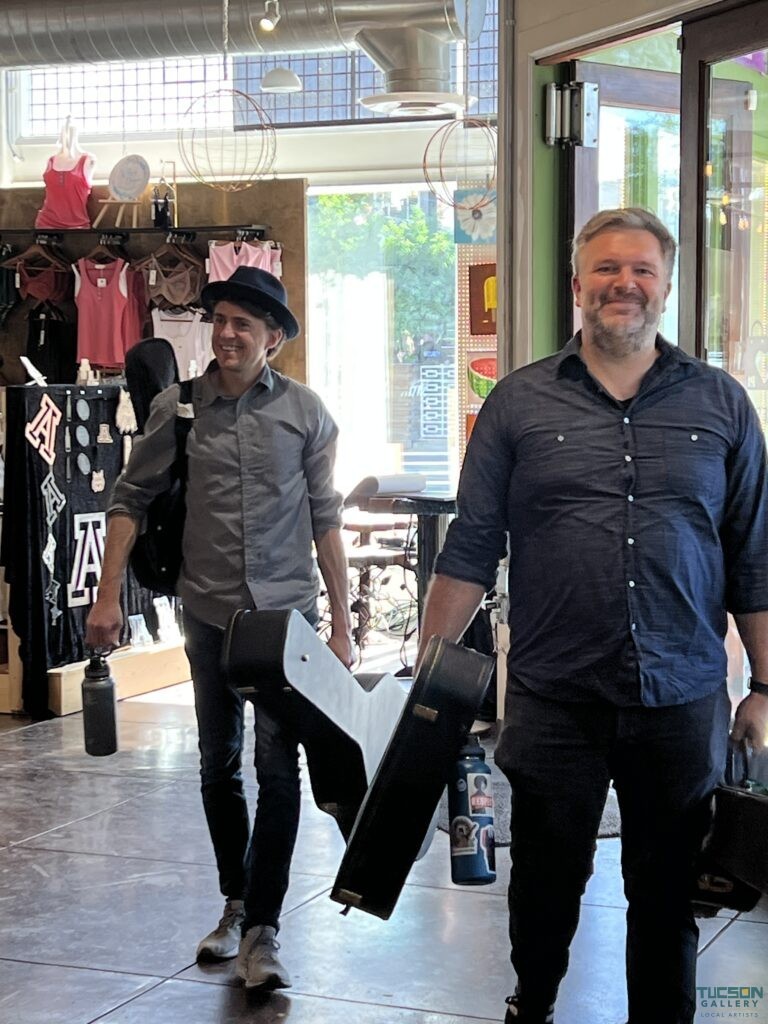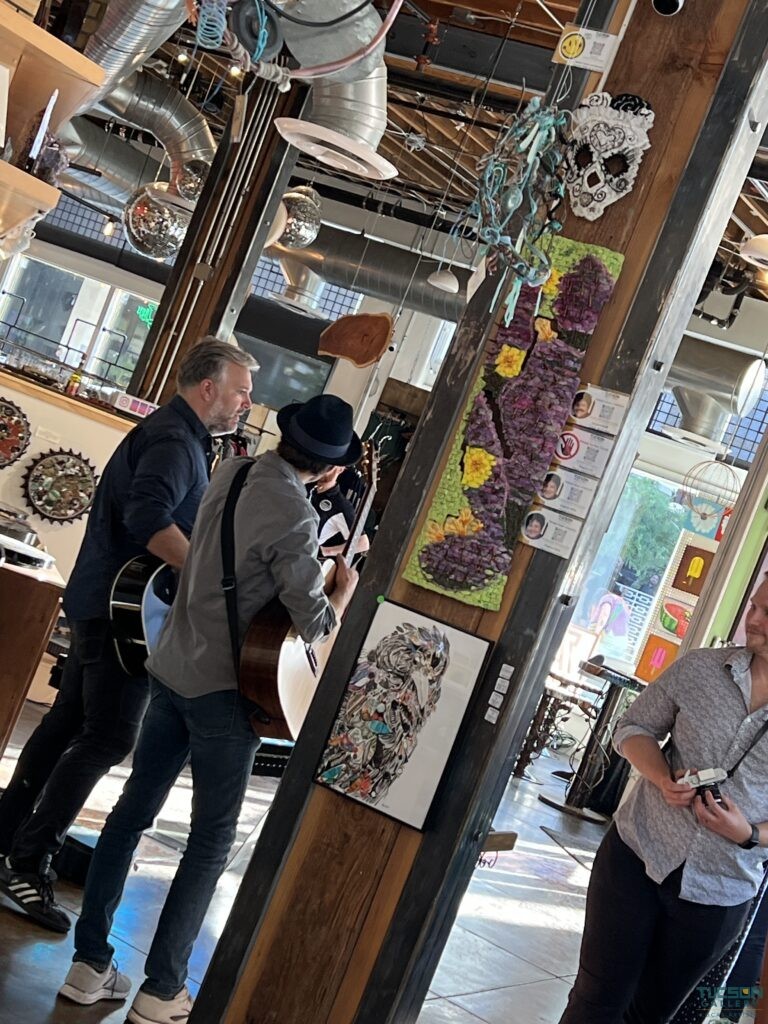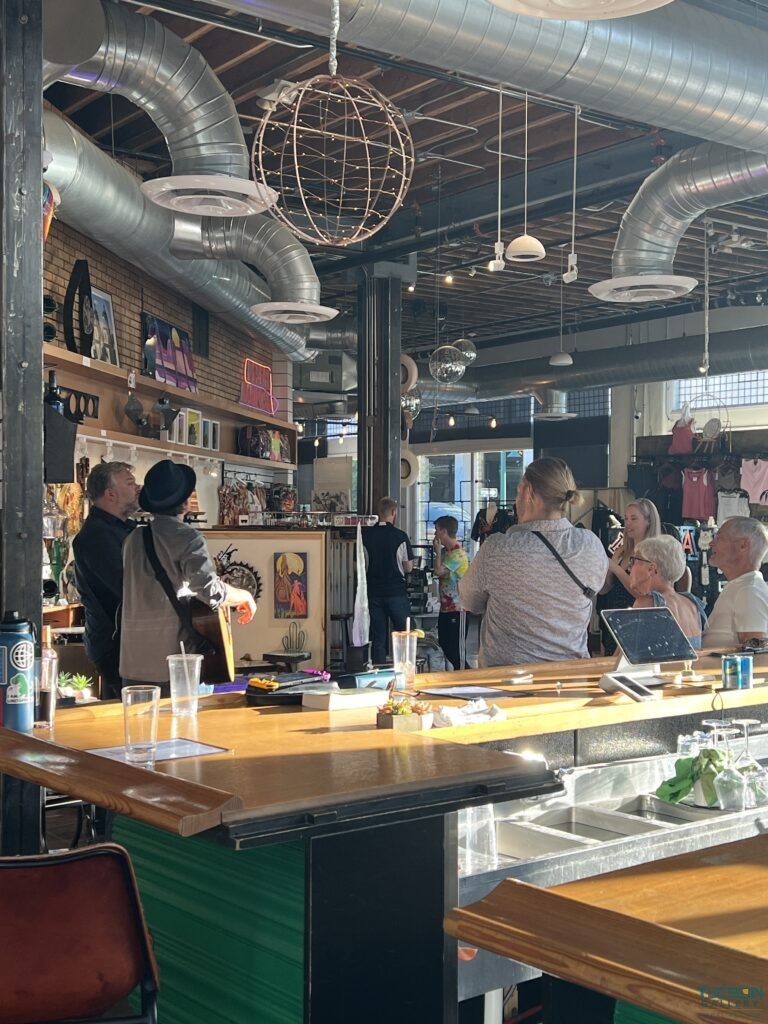Transcript (Unedited)
Tom Heath
Well here we are again with another installment of Meet the Artist, part of the series at the Tucson Gallery inside of the Proper Shops at 300 East Congress. We are in front of the Hotel Congress, we’re next to the Rialto Theater, you cannot miss us and as you know every week we have a different artist come in and talk about their their craft and meet the the adoring fans across Tucson that love them. And as part of that, we always get their agreement to do a little bit of a podcast. And tonight’s a little special because we have a different type of artist, the only musicians that have anything in the gallery. So we are blessed to have the duo here that is known as Ryan Hood, Ryan Green and Cameron Hood. So gentlemen welcome.
Ryan Green
Thank you. Thanks for having us. Meet the artist. Heck yeah. Thank you. I think we, I think there’s qualified thanks to you, Cameron, thanks to your art degree.
Cameron Hood
Yeah. My graphic design background.
Tom Heath
There was something to that because it wasn’t just an album. It was a book. It was a whole thing. It was like, all right. Plus, people know this. You’re my favorite band. So I’m like, they’re in. But that’s the other reason. When
Cameron Hood
I was going to the U of a here. I knew I wanted to be a musician being bands But I was like, I don’t know that that will work. I should have a fallback degree. So art was what I picked Thank you. You know, it’s so much more reliable. That’s good. Actually
Tom Heath
your parents were excited about that. Okay Well, he’s got art to fall back on, right? That’s awesome. So we’ve done an interview before on the other podcast, Life Longstreet Car. That was,
Ryan Green
I mean, when Under the
Tom Heath
Leaves was just coming out, so that was what, two years ago?
Cameron Hood
That was, yeah, 2021. Yeah, 2021. It was April 2021.
Tom Heath
Yeah, And I remember we were dealing with COVID requirements. You’re about to have a concert and and your big advertisement was the tables were appropriately spaced apart.
Cameron Hood
It’s crazy how much things have changed and so happy to be where we’re at right now.
Ryan Green
So where are we? Are you back on the road? You’re touring? Yeah, it’s starting back up this year. And we’re actually, this summer, planning to finish writing and begin recording a new album. And the touring is kicking back up. It’s a little slower for us than it is for, you know, Taylor Swift and Jason Isbell. I feel like the top tier artists are kind of getting the getting the first choice of fans out in the road. But I don’t feel like people are fully attending shows as much as they used to still yet. So we’re a little, we’re getting there, but it’s a, it’ll probably be a, how about half the pace this year as it was pre COVID for us.
Cameron Hood
Taylor’s getting all of the, uh, the arenas, you know, and so they’re not, they’re all booked. We can’t book the arenas like we’d like to. Cause she got them. Yeah. It wasn’t
Tom Heath
for Taylor Swift. You guys would be the arena band of the 21st century here. I’m sure the, uh, the, the festivals though, is that still a big thing for you? I know pre COVID you were doing, you were like all across the country, like in New Hampshire and everywhere else. Yeah.
Ryan Green
A lot in the, in the Northeast, a lot is where we used to live is a big area for us. So yeah, that’s kind of getting back going to everything changed for us. Also we switched our booking agency that we used to be with went under during COVID. They retired from the biz and so we’re sort of landed with a new booking agency now and a whole new thing beginning there. So that’s still in its infancy and this won’t be a particularly busy summer. We will be up in Michigan and Wisconsin next month and some stuff like that. I think Durango, Colorado, we just added something there. Cool.
Tom Heath
How does that work when you have a new booking agent? Do they have to get to know you all together?
Ryan Green
Yeah. It takes time. What’s interesting is you don’t really know if it’s working until about a year and a half down the road, because things get booked kind of far out. So we meet, we play some showcase, we go to some events where we’re showcasing for presenters, people like Chad Herzog here at Arizona Arts Live, folks like him around the country with their series and go to see acts at these showcases. And so we’ve gone to those and we’re presenting and our agent is pitching us at those. And we also have momentum from beforehand, so people are coming and asking and booking. But as far as new stuff, it takes some time to build into that new scene with the new person, but everything seems good so far. I’m just thinking of the movie, Blues Brothers, when
Tom Heath
they’re out trying to find gigs and they show up and they’re like, excuse me, man, what kind of music do you have here? And they’re like, Oh, we got both kinds country and West. Perfect fit. Perfect fit. All right. Yeah. So they changed their set a little bit, but they did just fine. I
Cameron Hood
think for us, we’re, we’re, we are kind of getting the engines going back up again. But it’s also, we’re, we’re kind of playing a long game with our band. And so right around the time COVID hit, we had already planned to take time off the road because we were just getting kind of naturally, I don’t want to say burned out, but like at the end of whatever that chapter was of going hard and touring and we needed to lay low. But that’s not even the first time that happened. That’s like probably seven or eight years before that, the same kind of thing happened where we’d just been going hard for a long time, and there was a natural breaking point where we got off the road, we kind of reassessed, and then we slowly kind of felt our way back out, like you step into a cold ocean, you kind of like make your way slowly. And there’s a metaphor that I really like, which is that I’ve gone to the ocean with some friends and I’ve seen some people be like, all right, I’m going to get out there. It’s going
Cameron Hood
to be cold, but I’m a dive in and they go do it. And then they burn bright and they burn out and they get out and they go lay on the beach. And I’m this sort of person who’s sort of like waddles out there very slowly getting used to it, but I often stay a lot longer. And I think that that’s true of our band too, that we’ve found ways to kind of naturally rest and power down and then slowly sort of power back up and find our sea legs again. And so we’re kind of in that process now. There’s kind of a breath of our band and in and out, and we’re kind
Tom Heath
of like starting to breathe back in again. Is that is that sort of a natural thing or does one of you step forward and say, look, I need a break or does he do a sort of both look at each other one day like, yeah, I think this is time. I
Ryan Green
think the first time it happened, you know, so we’ve been playing together about 20 years and the first time it happened, you know, seven years in or so, it was just exhaustion. And it was, we didn’t really know, it just sort of snuck up on us. We weren’t sure we wanted to keep going. And after some time off, we realized we did want to keep going. And then we had, so I think this last season, we sort of had the foresight to say, Hey, you know, we planned it a year and a half out again, because gigs get booked pretty far out. We told our agent, Hey, in 2020, we want to take clear. You plan the break, not going to break. You didn’t plan COVID, right? I want to make sure there’s still investigations into that. So edit that out, please. Uh, yeah, we, uh, we, we planned it to take the second half of 2020 off the road. I don’t remember which half.
Cameron Hood
Yeah, first half of 2020. And
Ryan Green
then it turned out everything shut down anyway. So we were already in a good spot because we were not touring at the time that happened. So yeah, now we kind of, we know, we’ve outlined, you know, that’s sort of, when we started as a band, we thought, you know, the secret is not breaking up. All the, all bands break up. We’re just going to stick with it. And it’s, you know, we’ve had to learn a lot of skills, personal skills and how to cope and also interrelational skills with how to, you know,
Cameron Hood
communicate, stay friends. Yeah.
Tom Heath
I mean you’re on the road a lot And I would imagine you’re not in the Taylor Swift motor coaches all the time.
Ryan Green
We don’t yet have separate buses. Yeah. No. Instead we share a Kia. No,
Cameron Hood
that’s 2024 is the plan for the separate buses.
Tom Heath
I’m sure we’ll get you there at this, uh, this podcast. Yeah. We’ll be, uh, we’ll be supporting you. So you, you mentioned you’re working on a new album. You’ve been together for 20 years. How many albums have you created in those 20 years? I’m
Ryan Green
going to guess seven or eight.
Cameron Hood
Yeah. Seven or eight, something like that. Let’s let’s listen to anyone. We’ll count them. All right. So we got sad and happiness forward. Yup. The world awaits. After night came sun. Yep. Start somewhere.
Ryan Green
Yearbook yearbook
Cameron Hood
on Christmas
Ryan Green
on Christmas under the leaves, under the leaves was eight. Yeah. And then there
Cameron Hood
was a kind of a best of, well, we won’t count
Ryan Green
that. So
Cameron Hood
eight studio. So we’re writing our ninth right
Tom Heath
now. And you cannot imagine the riveting radio it is when we’re counting on our fingers. So that’s hopefully the video will come out.
Cameron Hood
We know what makes really good art folks. We know you can tell. So
Tom Heath
we have eight albums and how far are you in the number nine?
Ryan Green
Well, writing-wise, I mean, We have nine songs in different stages right now. So some are written, but even when they’re done being written, there’s a big, you know, once you know the chord structure and the melodies and the lyrics of the whole thing, there’s still the big question of how you want to perform it, arrange it, what key it’s going to be in, who’s going to lead sing it, where you put harmonies, whether you’re going to flesh it out with some strings or bass or drums or things like that. There’s a lot of questions like that, so there’s quite a lot to be done still, even on the ones that are mostly written. But we at least have a framework of nine, and it’s possible another couple will make it in there as well. And
Tom Heath
under the leaves, It was really important that you had the companion book that went with that. That was kind of a unique piece. So you, you, you explained kind of
Cameron Hood
what that. Yeah. Well, we knew we wanted to make vinyl this time for the first time. I’ve actually been making the, uh, the album designs large enough to do vinyl for a long time. Cause I’ve had the secret hope that we would get into vinyl, but this was the first one we actually pressed. So we wanted to have a book that was the same size that could go with it. And we always work with this photographer, Taylor Noel, that we love working with. We basically kind of go, we want to feel like a little bit gritty and like maybe a little bit of light leaks and color. And then he’ll sort of like scratch his chin and go, there’s a certain kind of film that was produced in the late nineties only by this one company. If you shoot it on this particular kind of camera, we can get exactly what you’re talking about. So he’s this really good blend of technical know-how like artistic eye and then he’s just personal. He’s like, makes the process easy. So we always want to work with him. And he just shot a
Cameron Hood
bunch of stuff. There’s some of us, I think it was actually all in Mount Lemmon, a couple different shoots on Mount Lemmon, and some kind of B-roll type stuff of the leaves and capturing that kind of fall feeling and some stuff of just us. But
Ryan Green
it’s also the chance to like the written segment of the book, which is this chance to talk about the songs, which we’ve never gotten to do before.
Tom Heath
Right. It’s so interesting because you, I mean, you, you hear the lyrics and you sort of understand, but now the book really gives you the motivation or the thought process as to where you were.
Ryan Green
Yeah. And we each wrote an essay essentially for each song, if I remember correctly. So there’s both of our approach to it. And many times mine is
Ryan Green
more about maybe the musical decisions made the production decisions and maybe the emotions conjured up by it And many times Cameron’s is about the message and the this sort of intention of the song.
Cameron Hood
It’s really interesting because I’m a I’m a four on the Enneagram for any of our Enneagram listeners. That’s like a very artistic, individualistic feeling type. But I realized that in our band, I’m completely the thinker and Ryan is absolutely the, the keeper of the emotions of the band. So he, he’s the one who’s sort of closing his eyes and going in and trying to pull out an emotion and spell it out with chords and a melody. And I’m the one going, wouldn’t it be cool if we could say this, or if it meant this, or if we use this symbolism or this metaphor, but I’m very much stuck in my left brain in that sense. And Ryan is very good at living in his right brain and pulling out his emotions. Something I’m appreciating more and more as our band goes on,
Tom Heath
the differences between us. After 20 years, I mean, I’m sure these are revelations that sort of comes gradually over time. And I guess the music sort of starts to reflect that? I think so.
Cameron Hood
I think we’re respecting each other’s gift like way more than we ever have. There’s room for him to do all that he is and there’s room for me to be and do all that I am. And we’re stepping on each other’s toes less, honoring the other’s gift even
Ryan Green
more. I think that’s a thing as we get older, right? We just sort of start to like, you understand that you can’t change people, right? But you could change yourself and you work on yourself and you start to appreciate what people bring. And instead of us trying to, there’s probably more of a tug of war in the early albums of Push and pull and ideas and now it’s very much realizing, you know Like you said what each other’s strengths are and saying hey you do that. I’ll do this there’s plenty of room on this track and and it feels really good to feel respected and appreciated by him and I think vice versa. So it’s kind of amazing that growth is still happening. The last album was the first album, Under the Leaves, that really was written with that kind of balance where really for the most part, Cameron wrote all the lyrics for the most part, and I wrote all the music for the most part. And it was a balance we’ve never done before.
Cameron Hood
And our music is more Musically interesting than it’s ever been now So that’s like something that my ego just finally like let go of I think it was just like the best melodies are coming from the guy over here, you know to my right and Well, I guess
Cameron Hood
But in the many thousands of hours that we’ve spent on stage, Ryan is to my right and I know that I can count on him for good melodies and good chords. And I think I’ve just sort of embraced that now. I’m like, let me piece my thoughty, wordy ideas to your melodies. I
Tom Heath
just realized because I’ve never seen you in this way because it’s always Ryan Hood because you’re left to right and you’re backwards here so this is why there might be some anxiety with this interview.
Ryan Green
Yeah, Cameron does structure it. That was his idea at the beginning to have a stand on that side of each other so that it read Ryan Hood on the stage from the from the from the audience perspective left to right.
Tom Heath
So this might be too personal if it is. We’ll just cut it out. But I’m curious, like you do so much work together, you tour together. Like what’s the off time? Are your families close? Or do you just like need your break from each other? Well,
Ryan Green
we do live, we do live like one mile away from each other, which is pretty cool.
Cameron Hood
Yeah. I think the answer is both. I think we have plenty of time apart from each other when we’re home, but we see each other at least once a week. I’m over hanging out at his house and hanging out with his kiddos and stuff.
Ryan Green
Yeah. Well, and we, at some point around that middle part of, after that first kind of break sabbatical in our career we our touring model shifted to being Instead of going out we I mean there was a point where we actually went out We’d go up months at a time. You know, it was it There’s one time we went out for four months straight, where we never came home in the four months. It was just nonstop touring. That’s way too much. Don’t suggest that for anybody. Even if you had a bus, I don’t think that would be pleasant.
Ryan Green
We shifted to doing shorter runs and coming and going more. So instead of still doing maybe the same amount of shows a year, but instead of doing it all packed into a short amount of time, go out and do five shows, come back, go do seven shows, come back, uh, you know, maybe fly to the Northeast on a Wednesday, play Thursday, Friday, Saturday, Sunday, fly back Monday. And because we’re an acoustic duo, and it’s just the two of us and thanks to Southwest Airlines letting us take our instruments on and check in a bunch of bags for free. You know, we can do those sorts of runs. And anyway, long story short, that gave us some separation because we weren’t together all the time on the road. We’d go do shows, we’d come home. Even if we’re home for a week, we’re much fresher when we go back out for the next set of shows. We’re telling jokes on stage. We’re interacting with each other in a way that’s really natural and fresh. We’ve experienced some bit of life away from each other. So we have something
Ryan Green
new to bring to the table. When we’re together all the time, it gets dry on stage. And we try to pride ourselves on that kind of spontaneity on stage.
Cameron Hood
I think you, kind of the heart of your question, if you think about your husband or wife or partner, traveling with them, and then you think they are the person that you book your tickets with. Then you go to the airport with and then you spend your whole plane ride with, and then you book your car with, and you do your drive with, and then you load into the place that you’re going to be and you do your work together and you try to be both creative and have a good business sense together. And then you’re still together when you go eat dinner and then you’re together at the hotel room and then you get up in the morning, like there’s, I’m exhausted, right? Just listening to it. We all naturally need a little bit of, you know, of break of breath, I guess, you know, to come back to that metaphor again and it keeps it fresh, you know? So there’s just a little bit of room to come and go and to have something
Ryan Green
to bring. Even like, you know, splurging and getting two hotel rooms. It’s like, that makes a big difference, you know? It’s like, all right, that’s our little separation time. He can get up at six o’clock and go for a walk. I can sleep till 8.30, you know, whatever, whatever we both need. I love how good you’re making me look here.
Cameron Hood
Like I get up early. So healthy.
Tom Heath
I am for, or stumble in at 6.30, 10
Cameron Hood
o’clock. Exactly.
Tom Heath
A lot of these festivals, I just recently started getting involved with the Tucson Folk Festival as a volunteer and I’m getting to see a little bit behind the scenes, but there is a really tight sort of connection between artists, even artists that haven’t necessarily met, that they just seem to coalesce around these festivals. After doing this for 20 years now, are you sort of in that position where people are coming to you like, Hey, what are some tips? How do we, how do we keep this fresh? We’re brand new. I mean, are you in that role yet? Or as
Cameron Hood
far
Ryan Green
as sort of mentoring
Tom Heath
bands or something, either mentoring them or just, you know, being recognized as, you know, 20 years is a long time to be performing.
Ryan Green
The element is I feel like some, I don’t know, when you’re in, when you’re new in a band, it’s just hard to, you like, know everything, you know, I can’t imagine myself in our early years, even like, I can’t imagine myself, a young version of myself wanting to go to some band and even, and I, so it’s tricky. It’s, it’s a little bit trial by fire, but we do, we’ve done workshops at places before like that. Some there’s sometimes festivals where musical getaways where you were artists will lead workshops. And we’ve done things that touch on that, where we’ll talk about how to lift each other up on stage, not put each other down, and ways that that’s healthy for a show,
Tom Heath
but also for the duration of your band. Yeah, I would imagine if you get a little snarky on stage that that would carry over very quickly off stage. Yeah.
Cameron Hood
Yeah.
Ryan Green
We’ll go ahead. Well, I was guilty of that in the early… We used to street perform when we first started. And that’s really like… It’s hard. And there’s times when it just goes awry for whatever reason. I don’t know. Someone’s making fun of you or something and you’re just like not feeling good about it. And I would get insecure and often sort of cast blame. You know, he’s more of the, he’s the bigger personality on stage. And so I’d kind of deflect and be like, come on, Cameron, like
Cameron Hood
if it went wrong. Yeah, it was me.
Ryan Green
And, you know, I learned that I’ve learned since then.
Cameron Hood
I know you’ve taken some improv classes, Ryan, before I’ve taken some classes at unscrewed theater here in Tucson. And the whole big thing with improv is that you always say yes. And so whatever the other person is bringing, you affirm it and you add to it, you don’t go, no, that’s dumb ever, ever, ever, ever on stage. You’re always honoring what the other person is bringing. And then even if you disagree or want to go a different direction, you say yes to it. And then you lead the direction you want to go. And It’s just like, I think the whole thing becomes more of a love fest. We’re modeling how do we treat each other with dignity on stage. What I like about your
Ryan Green
approach to that, Cameron, is it’s bigger than just us two. He sees it as anybody. It could be the sound man. We’ve all been in a show where maybe there’s feedback or something, sometimes there could be a tendency for the artist to throw the sound person under the bus. Be like, hey man, can you get that together or something? Those sorts of things start to make everybody feel a little unsafe, I think. My favorite story is when we played the Falcon Ridge Folk Festival and we were doing a little side stage set at the Lost and Found tent. People who run the Lost and Found tent couldn’t go watch any of the shows. There was a person in that tent who was a fan of ours and said, will you come play a little 15 minute set here? So we were doing one in there, like 20 people unplugged and it was next to the big row of porta potties at the festival and the cleaning crew for the porta potties pulled up right as we’re doing our set and started vacuuming out the porta potties and you could hardly breathe. Everybody’s eyes were watering. It was so intense. And I got, I got all grumpy, you know, I was just like, Oh, of course, right during our set, this has to happen. What do you go, Cameron, Of all things. And then Cameron, the song ends and Cameron looks at the crowd and goes, can we all just take a minute to appreciate how lucky we are that these folks are here doing this for us so that we can have clean toilets. They’ve showed up to clean them all out for us. And in 20 minutes, we’re going to have shiny, clean toilets. And it shifted my everybody went from, you know, rubbing their eyes to just like, oh, yeah, that’s awesome. Wow. They’re cleaning those. I don’t you know, I’m grateful for that. And it was a it’s my favorite, you know, example of not throwing somebody under the bus. You lift them up and suddenly everybody feels safer and more included.
Tom Heath
Yeah. Well, before we wrap up here, I should announce that I think this podcast is now sponsored by Southwest Airlines, the friend of the musician traveling cross-country. We’ll try to get some money for that later. But album number nine, is there a tentative release date? Or are we just this early into it?
Cameron Hood
Like 2023? Don’t make any promises.
Ryan Green
Yeah, I won’t. You know, We’ll see how quickly we can get it going. And maybe it happens by year’s end. It’s probably more realistic to think it’s, you know, the early spring of next year. But if We could, if it goes great, I’d love to put it out by the end of the year.
Cameron Hood
That’d be amazing. Yeah. We, we meet every week for, you know, a few hours to write and, and make sure that we’re moving things forward, but we just doubled that time. So we’re, we’re starting to move into a time where we’re going to be devoting more and more time of our week to making sure that this is moving forward. I love all these songs. Good melodies, good ideas in all the songs. So I’m pretty psyched on it.
Tom Heath
All right, well we’ll prepare ourselves for a 2024 release and maybe get a Christmas present a little early for one of your Christmas shows. Well, gentlemen, thank you very much. It’s Ryan Green, Cameron Hood, they form Ryan Hood. They are our Meet the Artists feature tonight. If you want to listen to any of our other podcasts, we’ve interviewed now 15 plus artists. You can check them all out on the tucsongallery.com website in the media section. And also, you want to get on the events calendar so you can find out when all these artists are going to be live coming in and doing their meet and greets so that’s all on the Tucson gallery.com and Jonah once again excited to have you here thanks so much and I’m looking forward to the next album and maybe seeing you live here soon in Tucson.
Cameron Hood
always good to be with you Tom.
Tom Heath
Thank you for listening to Meet the Artist. This is a weekly production by the Tucson Gallery, located inside of the proper shops at 300 East Congress Street in Tucson, Arizona. The mission of the Tucson Gallery is to support local artists by providing a space to show their art, a forum to engage with their audience, a virtual presence to connect with global patrons, an outlet to earn a fair price, and an opportunity to hone their business skills. Head over to meetusangallery.com for more information about our live events, listen to other Meet the Artist podcasts, and check out the wide selection of art, gifts, and other items created by Tucson’s modern, thought-provoking, and forward-thinking artists.
